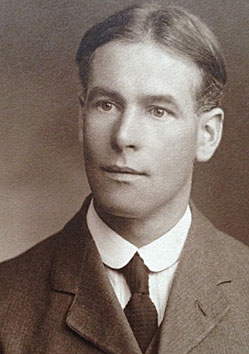|
Corder Catchpool has an unusual CO story. A dedicated member of the Society of Friends, he volunteered for the Friends Ambulance Unit at the outbreak of war at 29 along with his brother, Henry. Leaving Wanstead and his younger brother Jack (who would join the FAU in 1915) behind, he went to work in France in June 1914.
While in France, he worked with the FAU on an ambulance convoy, transporting wounded men rearward for treatment. During his time in France he wrote extensively on what he believed to be his calling - to work to save lives where he could, rather than volunteer to fight and kill in the carnage of the Western Front.
When Conscription was introduced in 1916 however, Corder began to change his mind about his work. Worried that “we (the FAU) are now in effect a conscript unit”, Corder believed that to continue working with the FAU would be a betrayal of his “loyalty to Pacifism and the Society of Friends” and so he resigned from the unit.
By September 1916, Corder had been called up for Military Service and faced the Wanstead Military Service Tribunal. Interestingly, due to his work with the FAU, he had been awarded the Mons Medal, and wore it during his Tribunal hearing! It was, however, to no avail and his claim of Absolute Exemption was turned down. Instead, the Wanstead Tribunal gave him exemption from Combatant Service only.
This was unacceptable to Corder, who had realised that any form of Military Service, non-combatant or not, was providing help to the war machine. Determined to resist all forms of war and militarism, Corder willingly turned down all alternative service and was sentenced to two years hard labour in prison.
Like many COs, from late 1916 onwards Corder found himself caught in a vicious and pointless cycle. After serving a prison sentence, he would be released back to the army and, upon disobeying military orders, would find himself back in prison with a fresh sentence. In all, he would serve four separate sentences from 1917 to January 1919 - almost exactly two years in total.
Throughout his time in prison Corder wrote many letters on topics ranging from the political and religious reasons for pacifism to book reviews and prison conditions. Though many of his letters show a cheerful and determined character, he was also a perceptive writer on the morality and legitimacy of the war, describing it as “the level of reason and morality that is pertinent to a street urchin’s squabble”. Corder saw the First World War for what it was - an avoidable, tragic and unnecessary slaughter without heroism, valour or reason.
His letters remain inspirational today and can show the strength of conviction needed to endure punishment simply for standing up to be counted as against militarism, war and murder:
“If it has been a disappointment that these anticipations have not been realised, it is because we have not realized that it is, to true men, a greater thing to live for a good cause than to die for it, and requires a higher order of courage”
|
|
 Do you have more information or a photo of THOMAS CORDER CATCHPOOL? Let us know Do you have more information or a photo of THOMAS CORDER CATCHPOOL? Let us know
About the men who said NO

CO DATA
Born: 15 Jul 1883
Died: 16 Sep 1952
Address: Ronceval, The Green, Wanstead, Essex
Tribunal: Wanstead, Exempted only from combatant service
Prison: Wormwood Scrubs, Exeter, Ipswich
HO Scheme:
CO Work: AU, France, 1914-16
Occupation: Engineer, cotton manufacture
NCF:YES
Absolutist
|

